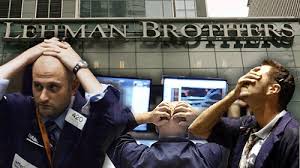Here’s How Rich You’d Be If You Stayed in the Stock Market at Lehman’s Collapse

Be “greedy when others are fearful,” Berkshire Hathaway CEO Warren Buffett famously said.
Had an investor indeed been greedy as the Lehman Brothers’ bankruptcy filing sent shockwaves across the global markets, they perhaps could have more than doubled their wealth since 2008.
Exactly nine years ago Friday, investment banking giant Lehman Brothers filed for bankruptcy after the federal government signaled that there would be no bailout. With assets of $ 638 billion, and debts of $ 613 billion partly spurred by heavy losses from mortgage-backed securities, the bankruptcy was the largest in U.S. history. It only added to the panic already building in markets. The S&P 500 had been steadily falling from its peak in late 2008 as worries surrounding the housing bubble and subprime housing crisis grew. The index would continue sliding as unemployment spiked to 10% and six homes were foreclosed on every minute until early 2009.
But if an investor had decided stay in through that volatility, they would have seen their portfolio rise about 2.5 times including dividends. So an investor with about $ 100 in the stock market at the time would hold something closer to $ 250 today. An investor with $ 1,000 would see their portfolio jump to $ 2,500. With about $ 400,000, they would have become a millionaire.
Still, the buy and hold strategy may not have been the best way forward. Lehman’s collapse and the subsequent recession was particularly bad for those just entering retirement in 2008, who watched as the S&P 500 fell as much as 56% between October 2007 and March 2009.
Retirees in general should worry about meeting a bear market early in retirement and the bull market later, a risk that has been dubbed “sequence of risk.”
That’s because a retiree starting out in the bear market is forced to liquidate more of their portfolio to cover their expenses — leaving them with fewer stocks to profit off a later bull run.
Meanwhile, a retiree who started out in a bull market would be able to liquidate less of their stock position early on to cover their expenses, and in theory earn enough to cover the rest of their lives when the bear market returns.
So though the market has gained 11% since the start of 2017, those who retired around the time of the financial crisis and saw their stock portfolios cut by the recession likely aren’t benefitting as much as they could be — making it rational to have exited stocks and headed for more stable, but lower-return assets such as gold or bonds around the time the Lehman Brothers filed for bankruptcy.
Th S&P 500’s returns since 2008 may also seem meagre in comparison to certain industries that have grown strong since the crisis. The S&P 500 Internet Retailers Index is now 13.5 times its 2009 value, while health care insurers risen to nearly 6 times their worth. Investors who bet on the world’s love of streaming via Netflix meanwhile would’ve seen their stake grow 46 fold.










